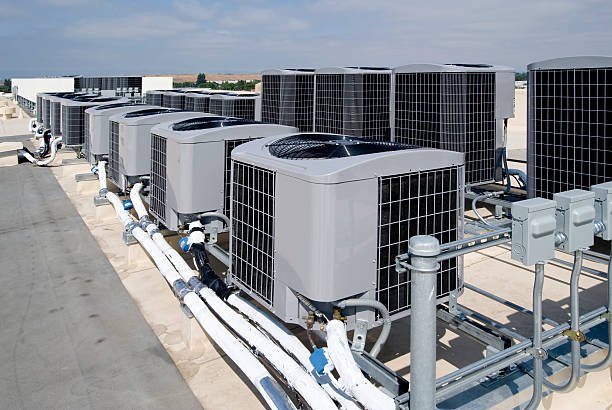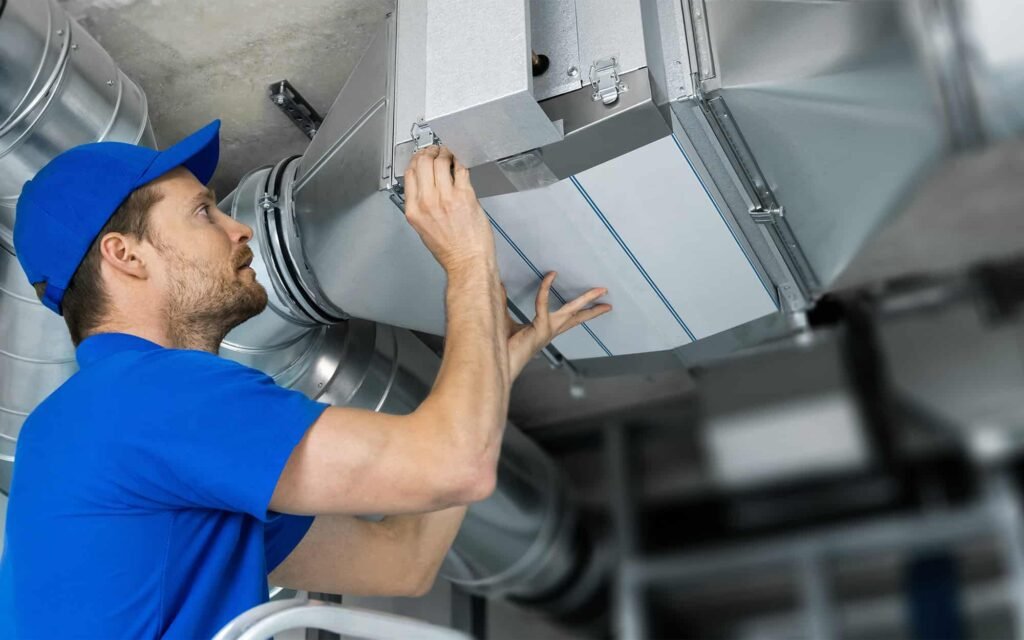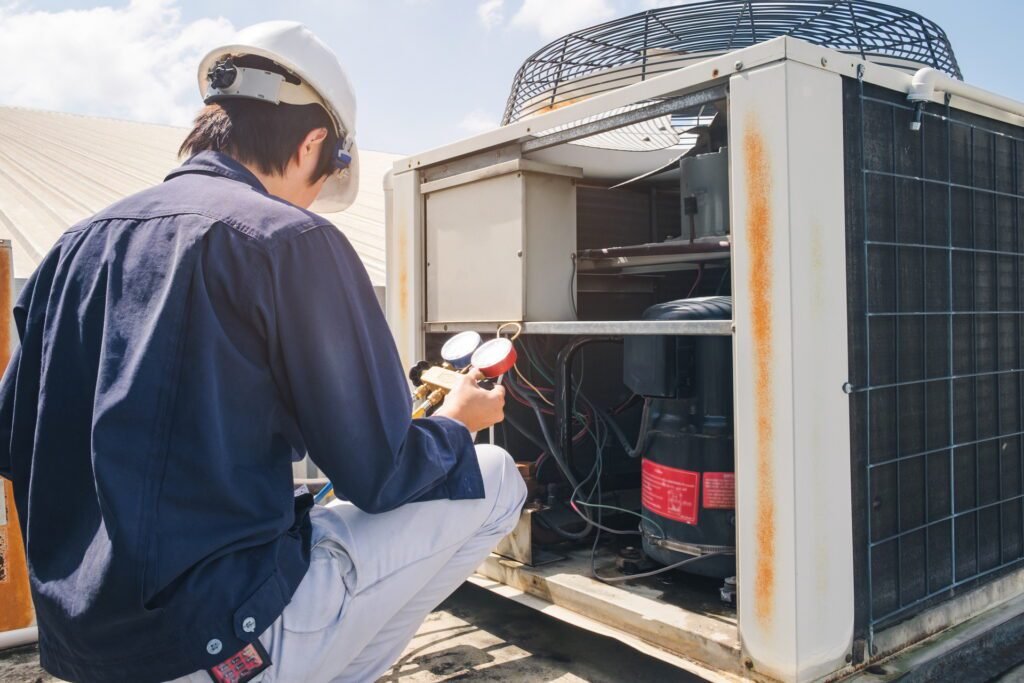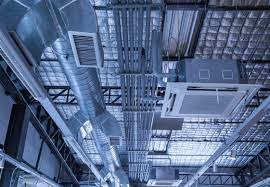What are Commercial HVAC Services, and How Do They Differ from Residential HVAC Services?
Table of Contents
ToggleHeating, Ventilation, and Air Conditioning (HVAC) systems are essential for creating comfortable indoor environments, whether in homes or large commercial buildings. While residential and commercial HVAC systems serve the same purpose—controlling temperature, humidity, and air quality—their scale, complexity, and service requirements differ significantly.
Commercial HVAC services refer to the installation, maintenance, and repair of systems specifically designed for large-scale spaces such as office buildings, warehouses, and industrial facilities. These systems are much larger and more complex compared to residential HVAC units, as they need to serve multiple rooms or even entire buildings with consistent heating and cooling. Residential HVAC services, on the other hand, focus on smaller, single-family homes or apartments, with simpler equipment designed to manage comfort in limited spaces.
The key differences include:
- Size and Capacity: Commercial units are larger and built to handle high demand.
- System Complexity: Commercial HVAC may involve rooftop units, chillers, and zoning systems, while residential units are simpler.
- Installation and Maintenance: Commercial systems require specialized technicians trained to work with advanced equipment, ductwork, and controls.
- Customization: Businesses often need tailored HVAC solutions, unlike standard residential setups.
Why Are Commercial HVAC Services Essential for Businesses and Large Buildings?
Commercial HVAC services are not just about comfort—they are critical for the overall functioning of a business. Proper heating, cooling, and ventilation affect employee productivity, customer satisfaction, equipment performance, and even building safety.
- Comfort and Productivity: Employees perform better in comfortable working environments. Poor temperature regulation can reduce focus and efficiency.
- Customer Experience: For businesses like retail stores or restaurants, a comfortable environment ensures customers stay longer and return in the future.
- Equipment Protection: Sensitive equipment such as computers, servers, or medical devices needs precise temperature and humidity control.
- Energy Efficiency: Professional HVAC services optimize system performance, helping businesses save on utility bills.
- Compliance and Safety: Many industries have strict indoor air quality standards. Regular servicing ensures compliance with health and safety regulations.
In short, without reliable commercial HVAC services, businesses risk higher costs, reduced employee morale, and dissatisfied customers. Forever Engineering LTD helps businesses maintain a safe and comfortable environment, which is essential for daily operations and long-term success.

What Types of HVAC Systems Are Commonly Used in Commercial Buildings?
Commercial HVAC systems vary depending on building size, usage, and energy needs. Some of the most common types include:
- Single Split Systems – Ideal for smaller commercial spaces; these provide heating and cooling for individual rooms.
- Multi-Split Systems – Connect multiple indoor units to a single outdoor unit, allowing zoning and energy efficiency.
- Variable Refrigerant Flow (VRF) or Variable Refrigerant Volume (VRV) Systems – Highly efficient, allowing simultaneous heating and cooling in different zones.
- Packaged Heating and Cooling Systems – Common in large spaces, often installed on rooftops to save indoor space.
- Chiller Systems – Used in very large facilities like hospitals, industrial plants, and universities.
- Heat Pumps – Efficient for moderate climates, offering both heating and cooling in one system.
The choice depends on building design, occupancy, and energy requirements.
How Often Should Commercial HVAC Systems Be Maintained or Serviced?
Unlike residential HVAC units, which typically need maintenance twice a year, commercial systems require more frequent attention due to their heavy workload and complexity.
- Preventive Maintenance: At least quarterly (every 3 months) checks are recommended for most commercial systems.
- Seasonal Inspections: Systems should be inspected before summer and winter to prepare for peak demand.
- Air Filters: Should be replaced or cleaned every 1–3 months, depending on building usage.
- Full Servicing: A comprehensive system inspection, cleaning, and testing should be conducted at least once or twice a year.
Regular maintenance prevents breakdowns, extends equipment life, improves efficiency, and reduces energy bills. Forever Engineering LTD offers scheduled maintenance programs to ensure long-term reliability and energy efficiency.

How Do Commercial HVAC Services Help Improve Indoor Air Quality?
Indoor air quality (IAQ) directly affects the health and comfort of building occupants. Poor air quality can lead to headaches, fatigue, allergies, or even respiratory issues. Commercial HVAC services play a vital role in maintaining healthy IAQ by:
- Air Filtration: Removing dust, pollen, and allergens with high-quality filters.
- Ventilation: Ensuring a steady flow of fresh air while exhausting stale or polluted air.
- Humidity Control: Maintaining balanced humidity levels to prevent mold growth or overly dry conditions.
- Regular Cleaning: Cleaning ducts, coils, and vents to prevent the buildup of dust and contaminants.
- Advanced Purification: Installing UV lights or air purifiers to eliminate bacteria, viruses, and volatile organic compounds (VOCs).
By improving air quality, commercial HVAC services help businesses provide healthier environments, reduce absenteeism, and enhance overall well-being.
What Factors Affect the Cost of Commercial HVAC Services?
The cost of commercial HVAC services varies depending on several important factors. Unlike residential systems, commercial units are larger and more complex, making service pricing less predictable. The main cost factors include:
- System Size and Complexity: Larger buildings require more extensive HVAC systems, which means higher costs for installation, repairs, and maintenance.
- Type of Service Needed: Routine maintenance is more affordable than emergency repairs or full system replacements.
- Age and Condition of Equipment: Older systems may need more frequent servicing and specialized parts, increasing expenses.
- Building Design: Complex layouts with multiple zones or rooftop systems may require additional labor and equipment.
- Frequency of Service: Regular preventive maintenance reduces long-term costs but requires an upfront service contract.
- Location: Service prices may vary depending on the region, labor rates, and climate conditions.
By understanding these factors, businesses can better plan budgets and make cost-effective decisions regarding their HVAC systems. Forever Engineering LTD provides transparent pricing, ensuring businesses get maximum value without compromising quality.
What Is Included in a Commercial HVAC Service Contract?
A commercial HVAC service contract is a preventive agreement between a business and a service provider, ensuring that HVAC systems are properly maintained throughout the year. While details vary, most contracts typically include:
- Scheduled Maintenance Visits: Regular inspections (quarterly, semi-annual, or annual) to keep the system running efficiently.
- Filter Replacement: Ensuring clean airflow and better indoor air quality.
- System Cleaning: Cleaning coils, ducts, vents, and other components to prevent buildup and inefficiency.
- Performance Testing: Checking airflow, temperature control, refrigerant levels, and overall system efficiency.
- Emergency Services: Priority response for urgent repairs or system breakdowns.
- Cost Savings: Discounts on labor, parts, or emergency calls, depending on the contract.
- Documentation: Detailed service records for compliance, warranties, and planning system upgrades.
These contracts are designed to prevent unexpected failures, extend system lifespan, and ensure consistent performance.
How Do Commercial HVAC Services Ensure Compliance with Building Codes and Safety Standards?
Commercial HVAC systems must meet strict safety and building code requirements. Professional HVAC services ensure compliance in several ways:
- Installation Standards: Systems are installed following local codes, manufacturer specifications, and energy efficiency guidelines.
- Regular Inspections: Routine maintenance checks identify issues before they cause safety or compliance violations.
- Indoor Air Quality Compliance: HVAC professionals ensure ventilation meets standards for fresh air intake and pollutant removal.
- Fire and Electrical Safety: Proper handling of wiring, gas lines, and ventilation reduces risks of fire or electrical hazards.
- Energy Codes: Many regions require businesses to meet efficiency standards to reduce environmental impact.
- Documentation and Certification: Service providers often provide compliance reports for audits, inspections, and insurance purposes.
Compliance not only avoids penalties but also promotes a safe, healthy, and energy-efficient environment. Forever Engineering LTD follows industry best practices and legal guidelines, ensuring that every project meets required codes and certifications.

What Are the Signs That a Commercial HVAC System Needs Repair or Replacement?
Knowing when to repair or replace a commercial HVAC system is critical to avoid downtime and costly failures. Common warning signs include:
- Uneven Temperatures: Hot or cold spots throughout the building indicate airflow or system inefficiency.
- Unusual Noises: Grinding, banging, or rattling sounds often signal mechanical problems.
- Rising Energy Bills: Higher utility costs may point to reduced system efficiency.
- Frequent Breakdowns: Regular repairs suggest the system is reaching the end of its life.
- Poor Air Quality: Dust, humidity problems, or odors indicate failing ventilation or filtration.
- Age of the System: Most commercial HVAC systems last 15–20 years. If older, replacement may be more cost-effective than continuous repairs.
Early detection of these signs can save money and prevent business disruptions.
What Role Does Technology Play in Modern Commercial HVAC Services?
Technology has transformed commercial HVAC services, making them smarter, more efficient, and easier to manage. Key advancements include:
- Smart Thermostats and Controls: Allow businesses to monitor and adjust temperatures remotely, improving comfort and energy savings.
- Building Automation Systems (BAS): Integrate HVAC with lighting, security, and energy management systems for full building control.
- Energy-Efficient Equipment: Modern HVAC units use advanced compressors, variable-speed fans, and eco-friendly refrigerants.
- IoT and Remote Monitoring: Technicians can track system performance in real-time, predicting failures before they happen.
- Data Analytics: Usage data helps optimize energy consumption and forecast maintenance needs.
- Air Purification Technologies: UV lights, HEPA filters, and advanced ventilation improve indoor air quality.
These innovations allow businesses to reduce operating costs, improve reliability, and create healthier indoor environments. Forever Engineering LTD integrates modern technology into its HVAC services, enabling businesses to benefit from greater comfort and cost savings.
Conclusion
At Forever Engineering Ltd, we understand that reliable commercial HVAC services are the backbone of comfort, safety, and efficiency in any business environment.
From installation and maintenance to repair and system upgrades, our expert team ensures that your HVAC system operates at peak performance all year round. With a commitment to quality, energy efficiency, and compliance with industry standards, we help businesses create healthier indoor environments, reduce operating costs, and extend the lifespan of their equipment.
Trust Forever Engineering Ltd for professional commercial HVAC solutions that keep your business running smoothly and your people comfortable.

